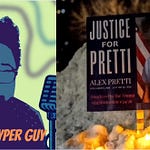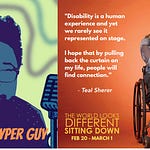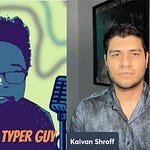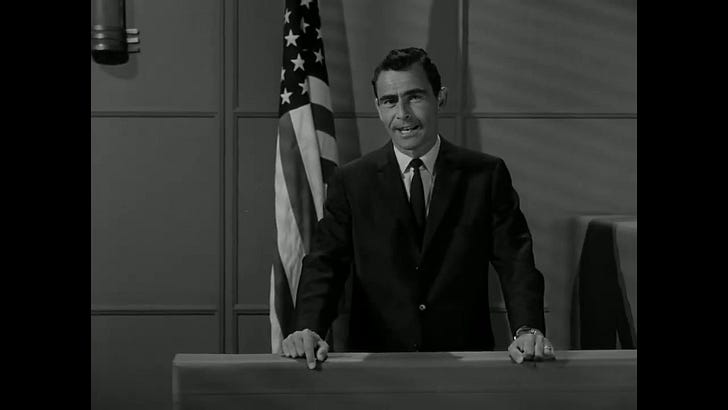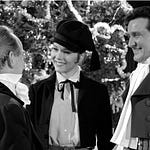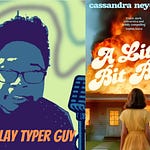The Academy Awards are tonight, so I thought you might enjoy my 2023 interview with author Laura Bogart about her personal relationship with Barbie, both the toys and the blockbuster, Oscar-nominated phenomenon.
Laura writes about pop culture, feminism, body image, and politics (among other topics). She’s a featured contributor to The Week and DAME magazine, and her work has appeared in The Atlantic, The Guardian, SPIN, The AV Club, Vulture, and Indiewire. I highly recommend her book, Don’t You Know I Love You, which would look great on your coffee table or nightstand.
Download the podcast above and/or watch the YouTube video below. Please like, share, and subscribe. Now, let’s go party.
Transcribed excerpts from our discussion:
LAURA BOGART: What I really saw in … Barbie’s journey throughout the movie and I don’t know how spoilery it’s okay for me to get here.
SER: Everyone in the world has seen this film, please go for it.
LAURA: Barbie’s journey is really one of moving into authenticity even if it’s painful even if it’s hard and it does not end with her and her daughter’s journey [or] getting with Ken … it does not end with her in any type of romantic attachment or even [her] interested in having one and in the essay I talk very much about this idea. There’s queer coding in the movie that is very overt like Kate McKinnon’s character. That’s very clear. She’s like in the splits, which is clearly a a reference to things that people do with their Barbies, right? And there's a big swath of non -binary folks and trans folks who really responded to Alan’s (Michael Cera) character — also a lot of gay men.
Barbie’s sort of journey is “I have this life, feels very routine. It works for me until it sort of doesn’t and I’m aware of something that I can’t put back in the box,” and they literally try to put her back in the box in the movie and she resists it, and in her instance it was sort of these thoughts of dying of mortality of the world beyond the world that she's living in and for me it was sort of this awareness that everything I had been told about … that i should want in life did not align with where my actual desires were.
I was not interested in dating boys in the same way that friends of mine were. I did not experience desire for men … I admired men as people and for a time wondered if I might be asexual.
There’s a really good piece by a writer named Scarlett Harris who talks about this depiction of Barbie really being important to the aromantic asexual community. As time went on you know my own awareness became … oh no actually you do have desire, it’s just it for other women.
And I was not expecting to see a genuinely subversive kind of move away from patriarchal structures that does not involve going back to any sort of conventional blonde perfection — you know male/female cake topper sort of thing — and I found the movie really resonant as i think about my own sort of movement away from, you know, compulsory heterosexuality into this life that I have now, and so I think that is an intimate emotional undercurrent of the movie which also touches on motherhood /womanhood, sort of the impossible contradictions of it.
SER: Barbie and I guess the closest analogue Black Panther were both these films that [said] it wasn’t enough to be filling a need and we’re going to be as safe as possible. They were both very overtly political texts. This is overtly political in the sense of where there’s a literal revolution [in both films] to reclaim [the nation] after a coup.
I find that wonderful and great to have audiences be receptive to it. And the fact that [director Greta] Gerwig did it in a way that’s [still engaging.] People are dressed up in pink and going up and then there’s all of the getting photographed and having fun. And I feel like that’s what folks really wanted in movies, having a fun time. And so this is a cool popcorn film that is about something.
LAURA: I mean, it carried Oppenheimer to some degree too. I mean the Barbenheimer memes. I mean, I did do Barbenheimer. I did go to see Barbie and Oppenheimer.
I think that there were a lot of people who were just … this an event. This is like a summer event thing that we can do and be in community with each other.
And I think there were a lot of people who might not have gone to see Oppenheimer. I have to be honest with you. I would have seen it anyway, just because I was curious about it, butI don’t know that I would have made a point.
My friend and I went to see it opening weekend. I don’t know that I would have made a point to see it on opening weekend. I might have waited down the line, but I wanted to participate in this event. Barbie is so big that I think it lifted all boats.





